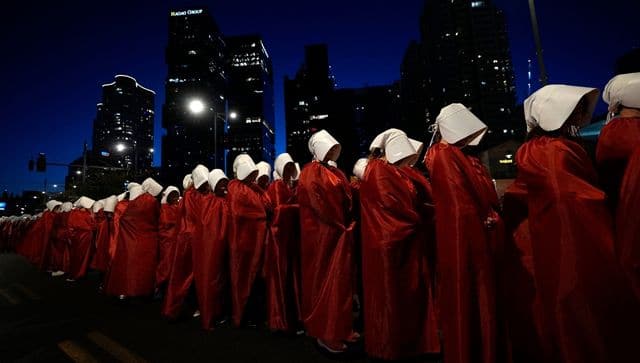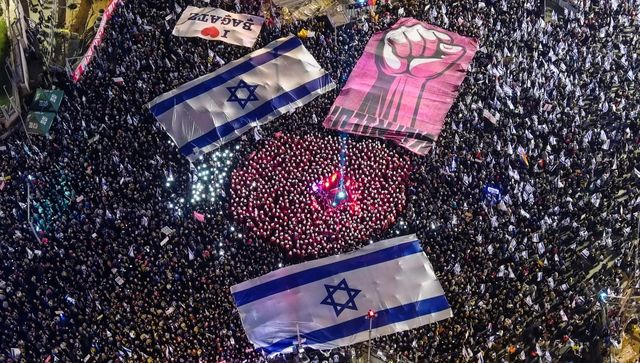Israel witnessed its biggest protests as hundreds of thousands of demonstrators marched down the country’s streets on Saturday (11 March). The protesters held rallies opposing Prime Minister Benjamin Netanyahu’s far-right government over judicial reforms, which they say threaten the country’s democracy, reported BBC. This Saturday was the 10th consecutive week that demonstrators flooded Israel’s streets. On Thursday, Israeli president Issac Herzog – whose role is largely ceremonial – called on the ruling coalition to press pause on the proposed legislation, calling it “a threat to the foundations of democracy”, reported Al Jazeera. What are these reforms that have brought a large number of Israeli protesters onto the streets? Why is the judicial overhaul being opposed and what do supporters of the law say? We explain. Israel’s proposed judicial reforms In the first week of January, Israel’s justice minister Yariv Levin unveiled the Netanyahu government’s plan to overhaul the nation’s legal system . This proposed legislation aims to increase the role of the government in the committee that appoints judges. Currently, a selection committee comprising politicians, judges and lawyers selects judges. The new system would grant the “lawmakers a majority in the committee, with most coming from the right-wing and religiously conservative ruling coalition”, as per an Associated Press (AP) report. Secondly, the proposed law has an “override clause” which would give the power to the 120-member Knesset, Israel’s parliament, to overturn rulings by the Supreme Court by a simple majority of 61 votes.
Israel does not have a written constitution but follows a set of regulations called “Basic Laws”.
A change approved on Monday also proposes to bar the Supreme Court from overturning these Basic Laws. The legislation also wants to strike off the judicial “reasonableness” test, which allows the apex court to “evaluate and invalidate government or public sector decisions as unreasonable”, as per The Times of Israel report. Levin also wants to enable ministers to select their own legal advisers, as well as make the opinion of ministry legal advisers and the attorney general nonbinding on ministers and the Cabinet, the report added. ‘Biggest protests in Israeli history’ On Saturday, in what the Haaretz newspaper said was “the largest demonstration in the country’s history”, demonstrators staged protests against the contentious judicial reforms. Organisers claim as many as 5,00,000 people attended Saturday’s protests, out of which 2,40,000 gathered in Tel Aviv. CNN reported that around a hundred demonstrators gathered outside president Herzog’s house in Jerusalem. Holding Israeli flags, they chanted slogans such as “Israel will not be a dictatorship.” Hundreds of Israeli women’s rights activists, dressed as characters of the dystopian TV series, The Handmaid’s Tale, joined protesters in Tel Aviv city, according to AP. [caption id=“attachment_12282802” align=“alignnone” width=“640”] Protesters are opposing Benjamin Netanyahu’s proposed judicial overhaul. AP[/caption] In the northern city of Haifa, a record 50,000 people held demonstrations, while another 10,000 gathered in Beersheba, as per Israeli media. “I’m demonstrating because the measures that the new government wants to take represent a real and immediate threat to Israeli democracy,” one protester in Tel Aviv, tech entrepreneur Ran Shahor, told the AFP news agency. Expressing similar concerns, Einat Gival-Levi, a protester, told AP, “We are protesting because if not, it’s like compliance and we will never agree to have democracy abolished in this country.” “It’s really important that we raise awareness all around the world," the protester added. “We are done being polite,” Shikma Bressler, an Israeli protest leader, was quoted as saying by CNN. “If the laws being suggested will pass, Israel will no longer be a democracy.” Opposition to the proposed legislation has sprung up across society, with even business leaders and legal officials speaking out against it, reported AP. Former prime minister Ehud Barak – one of the country’s most decorated military leaders – has been taking part in the protests, along with the former prime minister and opposition leader Yair Lapid and former justice minister Tzipi Livni, noted Vox. At one of the rallies on Saturday, Lapid said this was Israel’s “greatest crisis”, reported BBC. Last Thursday, Netanyahu had to be airlifted to the country’s main international airport for a trip abroad after several cars and protesters blocked roads to prevent him from leaving. Earlier last week, reserve fighter pilots in an elite Israeli Air Force squadron refused to turn up for training. However, later they agreed to hold talks with their commanders, as per BBC. As per a poll conducted last month for the Israel Democracy Institute, around two out of three (66 per cent) Israelis say the apex court should be able to repeal laws “incompatible with Israel’s Basic Laws, and about the same proportion (63 per cent) say they support the current system of nominating judges”, reported CNN. What does the Opposition say? Critics fear the proposed legislative overhaul would knock down the country’s system of checks and balances and give unfettered power to the prime minister and his allies. Some opponents also believe that the new reforms could give Netanyahu, who is on trial for corruption, an “escape route” from the charges, as per Al Jazeera. The prime minister has denied all the allegations. Yehuda Shaul, an Israeli activist and co-director of the think tank Ofek: The Israeli Center for Public Affairs, told Vox that the Israeli government is taking up “two revolutions at once” with these reforms. [caption id=“attachment_12282842” align=“alignnone” width=“640”]
Protesters are opposing Benjamin Netanyahu’s proposed judicial overhaul. AP[/caption] In the northern city of Haifa, a record 50,000 people held demonstrations, while another 10,000 gathered in Beersheba, as per Israeli media. “I’m demonstrating because the measures that the new government wants to take represent a real and immediate threat to Israeli democracy,” one protester in Tel Aviv, tech entrepreneur Ran Shahor, told the AFP news agency. Expressing similar concerns, Einat Gival-Levi, a protester, told AP, “We are protesting because if not, it’s like compliance and we will never agree to have democracy abolished in this country.” “It’s really important that we raise awareness all around the world," the protester added. “We are done being polite,” Shikma Bressler, an Israeli protest leader, was quoted as saying by CNN. “If the laws being suggested will pass, Israel will no longer be a democracy.” Opposition to the proposed legislation has sprung up across society, with even business leaders and legal officials speaking out against it, reported AP. Former prime minister Ehud Barak – one of the country’s most decorated military leaders – has been taking part in the protests, along with the former prime minister and opposition leader Yair Lapid and former justice minister Tzipi Livni, noted Vox. At one of the rallies on Saturday, Lapid said this was Israel’s “greatest crisis”, reported BBC. Last Thursday, Netanyahu had to be airlifted to the country’s main international airport for a trip abroad after several cars and protesters blocked roads to prevent him from leaving. Earlier last week, reserve fighter pilots in an elite Israeli Air Force squadron refused to turn up for training. However, later they agreed to hold talks with their commanders, as per BBC. As per a poll conducted last month for the Israel Democracy Institute, around two out of three (66 per cent) Israelis say the apex court should be able to repeal laws “incompatible with Israel’s Basic Laws, and about the same proportion (63 per cent) say they support the current system of nominating judges”, reported CNN. What does the Opposition say? Critics fear the proposed legislative overhaul would knock down the country’s system of checks and balances and give unfettered power to the prime minister and his allies. Some opponents also believe that the new reforms could give Netanyahu, who is on trial for corruption, an “escape route” from the charges, as per Al Jazeera. The prime minister has denied all the allegations. Yehuda Shaul, an Israeli activist and co-director of the think tank Ofek: The Israeli Center for Public Affairs, told Vox that the Israeli government is taking up “two revolutions at once” with these reforms. [caption id=“attachment_12282842” align=“alignnone” width=“640”] Opposition to the proposed legislation has sprung up across society, with even business leaders and legal officials speaking out against it. Reuters[/caption] “One is inside Israel: getting rid of any remains of checks and balances, independence of the judiciary, going full-blown illiberal democracy Orbán-style,” referring to Hungary’s prime minister. “Then there is the second revolution, which is the changes in the Israeli governance in the occupied territories, mainly in the West Bank. That is one word: annexation.” As per AP, Netanyahu’s coalition government wants to overrule the Supreme Court’s “rulings outlawing Israeli outposts on private Palestinian land”. What do supporters say? The Netanyahu government has continued to push the legislation despite the crisis gripping Israel. The supporters of the overhaul plan argue it is necessary to “rebalance” power away from an “activist” judiciary toward the people’s elected representatives, and doing this would “strengthen democracy", reported The Times of Israel. The prime minister and his allies have also condemned the protests, accusing the critics of trying to create anarchy. “The extreme and dangerous group that organises [the protests] just wants to burn down the house and create chaos in the country,” Netanyahu said earlier. With inputs from agencies Read all the
Latest News
,
Trending News
,
Cricket News
,
Bollywood News
, India News
and
Entertainment News
here. Follow us on
Facebook
,
Twitter
and
Instagram
.
Opposition to the proposed legislation has sprung up across society, with even business leaders and legal officials speaking out against it. Reuters[/caption] “One is inside Israel: getting rid of any remains of checks and balances, independence of the judiciary, going full-blown illiberal democracy Orbán-style,” referring to Hungary’s prime minister. “Then there is the second revolution, which is the changes in the Israeli governance in the occupied territories, mainly in the West Bank. That is one word: annexation.” As per AP, Netanyahu’s coalition government wants to overrule the Supreme Court’s “rulings outlawing Israeli outposts on private Palestinian land”. What do supporters say? The Netanyahu government has continued to push the legislation despite the crisis gripping Israel. The supporters of the overhaul plan argue it is necessary to “rebalance” power away from an “activist” judiciary toward the people’s elected representatives, and doing this would “strengthen democracy", reported The Times of Israel. The prime minister and his allies have also condemned the protests, accusing the critics of trying to create anarchy. “The extreme and dangerous group that organises [the protests] just wants to burn down the house and create chaos in the country,” Netanyahu said earlier. With inputs from agencies Read all the
Latest News
,
Trending News
,
Cricket News
,
Bollywood News
, India News
and
Entertainment News
here. Follow us on
Facebook
,
Twitter
and
Instagram
.
Sub-Editor at Firstpost. Writing Explainers on everything from politics to space.
)